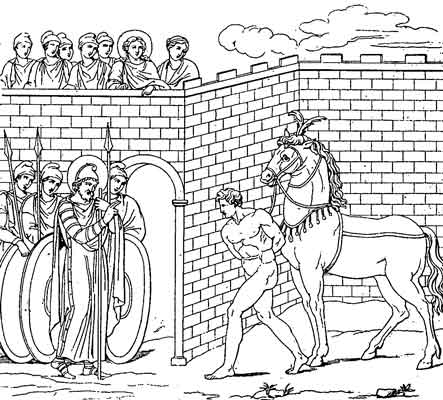Horace's poem 1.9 included many Epicurean eements. This is the famous "carpe diem" poem. Seizing the day is very Epicurean: it forces you to live in the moment and find pleasure in the things around you at that moment. Epicurus also...
TO BE CONTINUED.
Monday, May 17, 2010
Philosophy Journal
This week we studied 5 philosophical texts disguised as children's stories. I would not read many of these stories to my children, because after analyzing them philosophically, they are corrupt according to Epicurean principles.
- Laura Numeroff: The mouse in this story asks for a cookie- something he
wants, but that does not satisfy his pleasure. The mouse then asks for all sorts of other stuff. This mouse is a brat - he is never satisfyed and always wants more pleasure. This is not Epicurean because the pleasure is temporary, and not beneficial to the individual. In the end, the mouse isn't happy.
- Arnold Lobel: In this story, there is a frog and a toad. The toad makes cookies and then wants to eat them ALL! Frog and toad sit around the cookies and eat until they are almost sick. They decide that they need some "willpower" and try to hide the cookies from themselves, but it doesn't work - all they can think about is cookies. This is not Epicurean because frog and toad are not pleased with just one cookie - they always want more, and more, and more!
- Leo Lionni: While this story ended up with a happy-somewhatEpicurean-ending, the behavior of the frogs previosuly was anything but. Each frog claimes a piece of the land to itself; one took the earth, one took the water, and one took the air. Even though they had their own area, they always fought about boundaries and yelled constantly. These frogs are not Epicurean because they try to find pleasure in the wrong ways (for example, stealing and claiming land).
Monday, April 12, 2010
Sinon Blog
Sinon's fabricated story, although false, was very believable and overall accepted as the truth my many Trojans. Sinon's most important element in making his lie work was incorporating small truths into his story. For example, Sinon talks about Palamedes who was killed by Odysseus. The Trojans have heard the se names and already know this story, so by encorporating this, Sinon is effective. Also, Sinon talks about the origins of the horse. He tells the Trojans that it is a piece offering to Pallas - because the Greeks sacked her temple. This also is effective because it is the sole interest of the Trojans at the time, and Sinon makes the horse make sense. Finally, throughout his whole story, Sinon just tells the Trojans what they want to hear. He, a Greek, talks about how horrible he thinks his origins are - even that he himself hates Greeks! He especially hates Odysseus, who the Trojans fear. This makes the Trojans feel comfortable that Sinon is on their side. In conclusion, Sinon is a tricky little thing.
se names and already know this story, so by encorporating this, Sinon is effective. Also, Sinon talks about the origins of the horse. He tells the Trojans that it is a piece offering to Pallas - because the Greeks sacked her temple. This also is effective because it is the sole interest of the Trojans at the time, and Sinon makes the horse make sense. Finally, throughout his whole story, Sinon just tells the Trojans what they want to hear. He, a Greek, talks about how horrible he thinks his origins are - even that he himself hates Greeks! He especially hates Odysseus, who the Trojans fear. This makes the Trojans feel comfortable that Sinon is on their side. In conclusion, Sinon is a tricky little thing.
 se names and already know this story, so by encorporating this, Sinon is effective. Also, Sinon talks about the origins of the horse. He tells the Trojans that it is a piece offering to Pallas - because the Greeks sacked her temple. This also is effective because it is the sole interest of the Trojans at the time, and Sinon makes the horse make sense. Finally, throughout his whole story, Sinon just tells the Trojans what they want to hear. He, a Greek, talks about how horrible he thinks his origins are - even that he himself hates Greeks! He especially hates Odysseus, who the Trojans fear. This makes the Trojans feel comfortable that Sinon is on their side. In conclusion, Sinon is a tricky little thing.
se names and already know this story, so by encorporating this, Sinon is effective. Also, Sinon talks about the origins of the horse. He tells the Trojans that it is a piece offering to Pallas - because the Greeks sacked her temple. This also is effective because it is the sole interest of the Trojans at the time, and Sinon makes the horse make sense. Finally, throughout his whole story, Sinon just tells the Trojans what they want to hear. He, a Greek, talks about how horrible he thinks his origins are - even that he himself hates Greeks! He especially hates Odysseus, who the Trojans fear. This makes the Trojans feel comfortable that Sinon is on their side. In conclusion, Sinon is a tricky little thing.Sunday, March 14, 2010
Haiku
Father must calm me.
Aeneas is in trouble.
And I am worried.
Sum placanda se.
Aeneas est turbidus.
Sollicita et sum.
*Se = him (father)
*Ego (I) implied in third line.
*Ellision between a and e in third line.
Monday, March 8, 2010
Aeneas Question (Pg. 63)
Aeneas can be compared to the great man in verse 151. Both are great leaders. The great man eased the minds of the rioters, and Aeneas eases the minds of his men after the troubles they have endured. Both the rioters from verse 151 and Aeneas' shipmates quiet and calm down because of the inspirational speeches of their leaders. Aeneas is very much like the great man because he is able to control a large group of people and keep them optomistic.
Monday, March 1, 2010
Thursday, February 11, 2010
Subscribe to:
Posts (Atom)

